Understanding the Root of Alcohol Breath
Dealing with alcohol breath can be a challenge, especially when engaging in social interactions after consuming alcoholic beverages. This pervasive smell stems from processes that occur internally in response to alcohol intake. By exploring both the causes and solutions for alcohol breath, individuals can better manage this issue, ensuring their breath remains fresh and pleasant.
The Biological Mechanism Behind Alcohol Breath
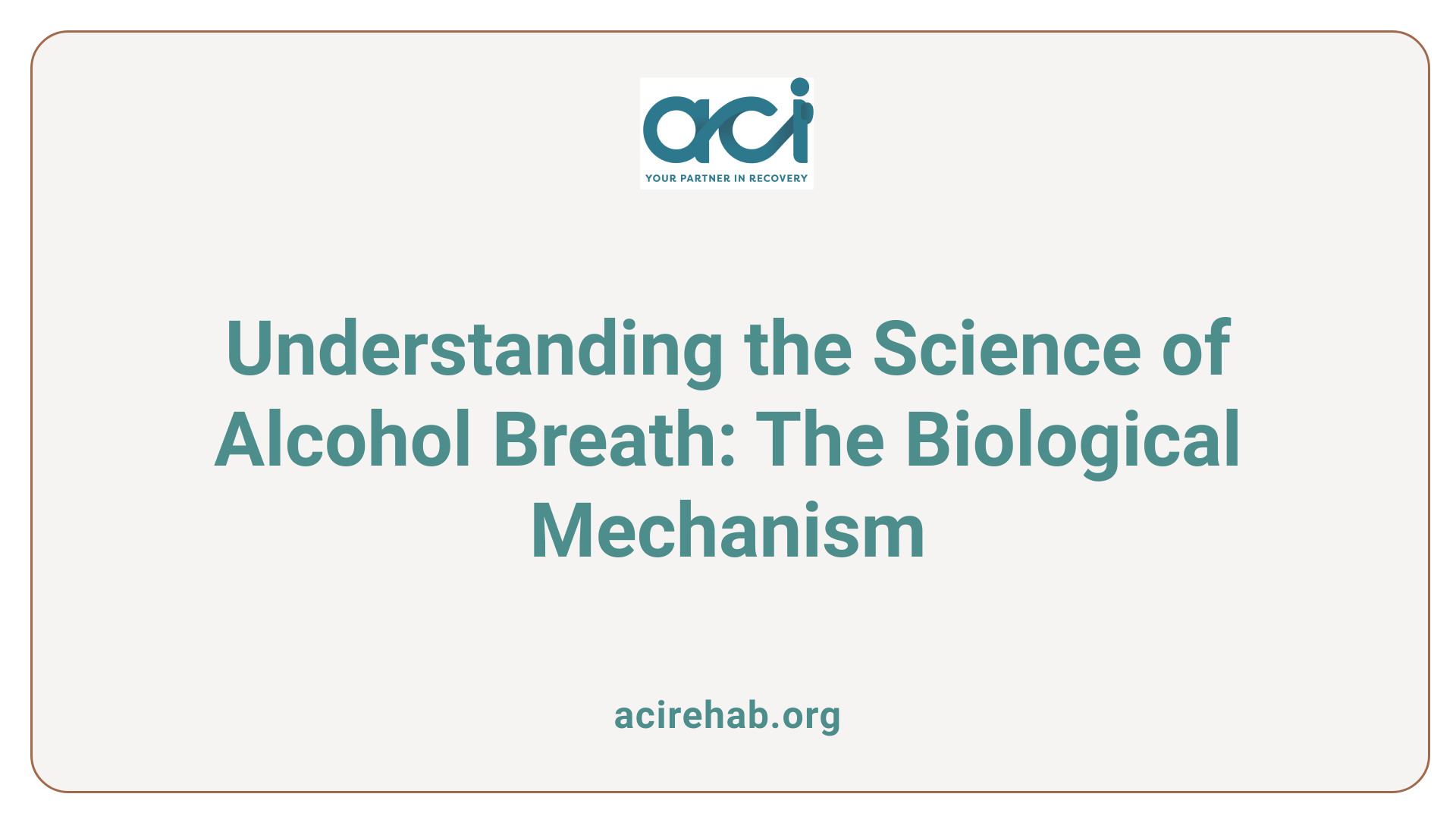
What causes alcohol breath?
Alcohol breath is primarily caused by the metabolism of alcohol in the body, where it is broken down into acetaldehyde, a compound with a strong odor that is then exhaled through the lungs. This metabolic process typically leads the body to eliminate about 10% of consumed alcohol through breath and urine. The unpleasant smell is a direct result of these byproducts dispersing into the breath.
Role of acetaldehyde in breath smell
Acetaldehyde is a significant player in the formation of alcohol breath. As the liver processes ethanol from alcoholic beverages, it converts it into acetaldehyde, which is released into the bloodstream. From there, it makes its way to the lungs, where it is exhaled as a volatile compound, contributing to the distinct and strong odor often associated with drinking. This means that typical mouth fresheners and even brushing teeth may not effectively eliminate the underlying problem.
Impact of dry mouth on breath
In addition to acetaldehyde, alcohol consumption negatively impacts saliva production, leading to dry mouth. Saliva plays a crucial role in washing away food particles and bacteria that cause bad breath. When alcohol is consumed, dehydration occurs, worsening the mouth’s dryness and enabling odor-causing bacteria to flourish. This combination of factors amplifies the alcohol breath odor, making hydration and oral hygiene essential for mitigation.
| Factors | Description | Impact on Breath Odor |
|---|---|---|
| Ethanol Metabolism | Alcohol is metabolized to acetaldehyde and other compounds | Contributes significantly to breath smell |
| Acetaldehyde | A byproduct of alcohol processing that has a strong odor | Directly causes the characteristic smell of alcohol breath |
| Dry Mouth | Resulting from alcohol’s diuretic effect | Encourages bacterial growth, compounding the smell |
Practical Solutions to Mask Alcohol Breath
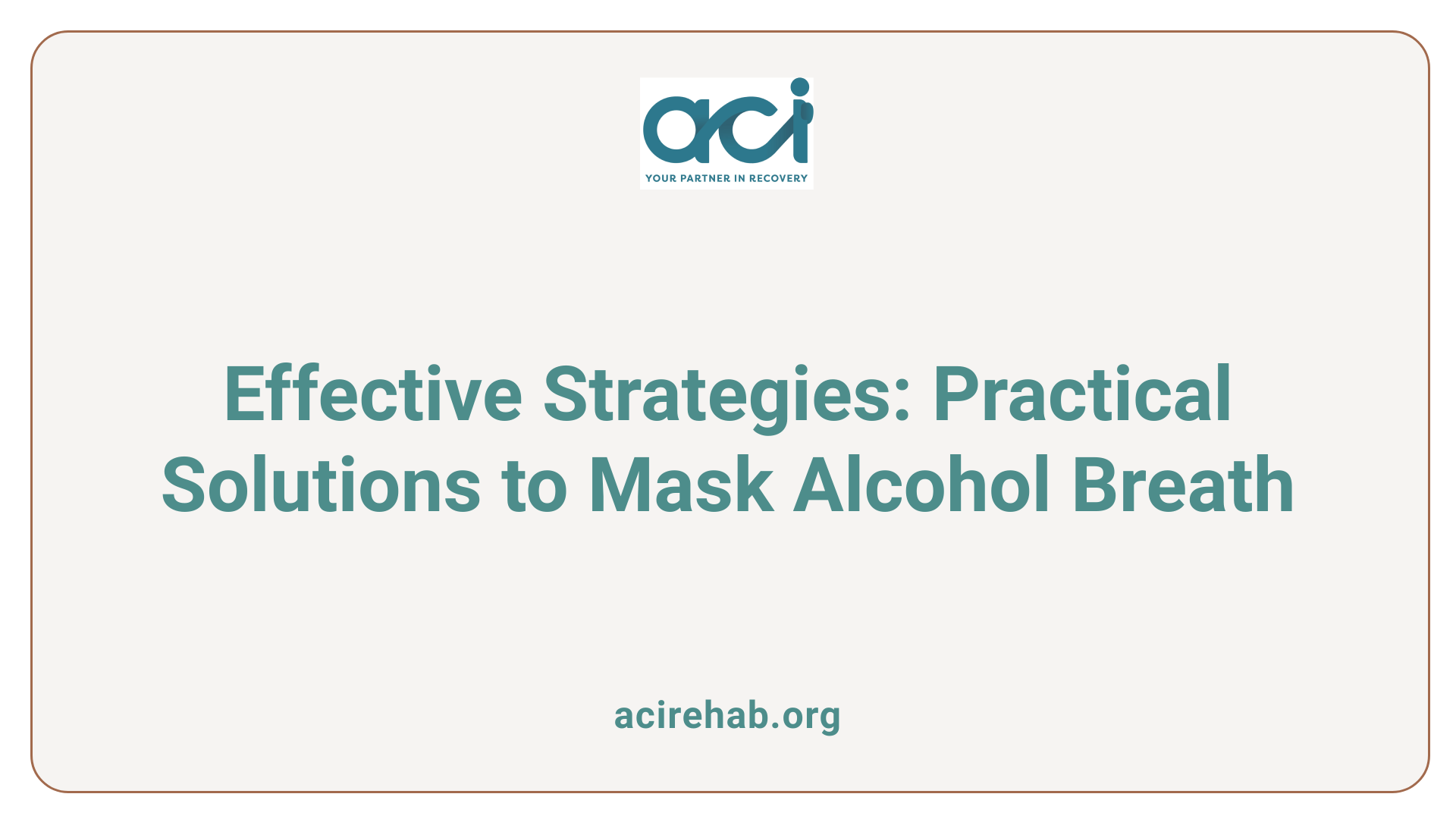
How can I reduce or mask the smell of alcohol on my breath?
Reducing or masking the smell of alcohol breath requires a multi-faceted approach focusing on hydration, oral hygiene, and dietary choices.
Hydration
Staying hydrated is one of the most effective ways to manage alcohol breath. Alcohol is a diuretic, leading to dehydration and dry mouth, which can exacerbate bad breath. Drinking water helps dilute the alcohol in your saliva and facilitates saliva production, which is crucial for washing away odor-causing bacteria. Aim to drink plenty of water during and after alcohol consumption to flush alcohol out of your system.
Oral Hygiene
Good oral hygiene practices play an essential role in combating bad breath. After drinking, brushing your teeth, flossing, and using mouthwash (preferably alcohol-free) can help remove lingering alcohol residues and bacteria from your mouth. Don’t forget to cleanse your tongue, as it can harbor odor-causing bacteria. Additionally, using a travel oral care kit can be handy for freshening up when you’re on the go.
Gum and Mints
Chewing gum or sucking on mints can provide a temporary fix for alcohol breath. Opt for sugar-free options, especially those containing xylitol, which help stimulate saliva production and inhibit oral bacteria growth. This not only freshens your breath but also helps wash away residual alcohol odor.
Natural Remedies
Incorporate natural remedies into your routine to counteract bad breath. Citrus fruits like lemons can help neutralize harmful compounds in your mouth. Chewing herbs such as parsley, known for its chlorophyll content, may also provide relief. Foods with robust flavors, like garlic or peanut butter, can temporarily mask the smell of alcohol until your body metabolizes it fully.
Keeping these strategies in mind can help you manage alcohol breath effectively, ensuring that social interactions remain pleasant.
Impact of Alcohol Type on Breath Odor
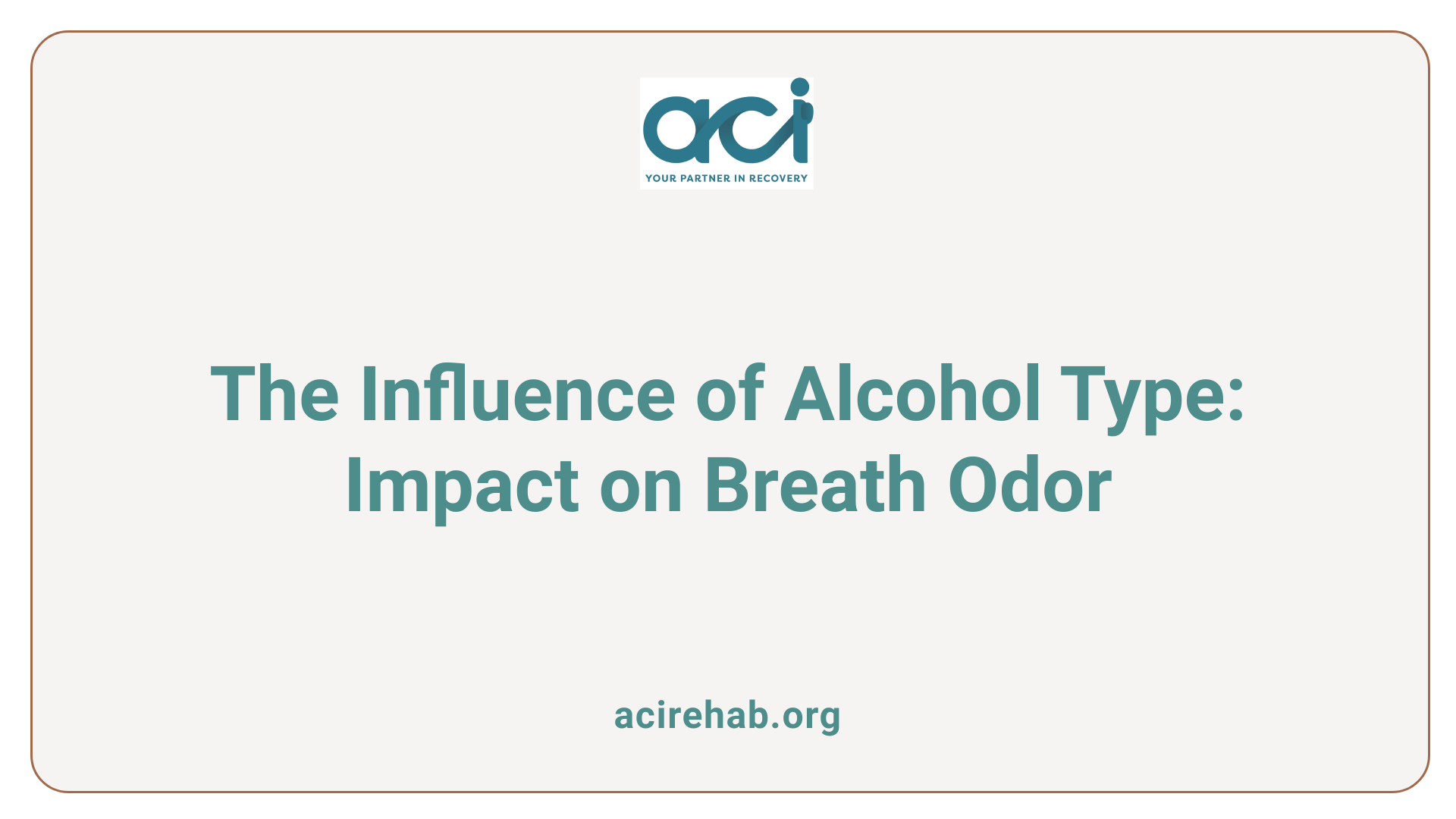
Are there certain types of alcohol that don’t leave a smell on your breath?
No type of alcohol is completely odorless on the breath. All alcoholic beverages contain ethanol, which is metabolized by the body and can be detected in breath emissions. While clear spirits like vodka and gin may be perceived as having a milder odor compared to darker liquors such as whiskey or rum, they still produce a detectable smell during metabolism.
Ethanol’s role in breath odor originates from the process of breakdown in the liver, producing compounds like acetaldehyde, notorious for their strong odor. Drinking neutral-smelling alcohols may not prevent the unpleasant smells associated with alcohol breath; these odors will still emerge primarily from the lungs.
To minimize the impact of alcohol breath, moderation is key, along with staying well-hydrated. Although remedies like chewing gum or gargling with mouthwash can help temporarily mask the smell, they do not eliminate the underlying odor generated by alcohol metabolism. Therefore, to effectively avoid alcohol breath, abstaining from alcohol consumption is the most reliable approach.
How Long Will Alcohol Affect Your Breath?
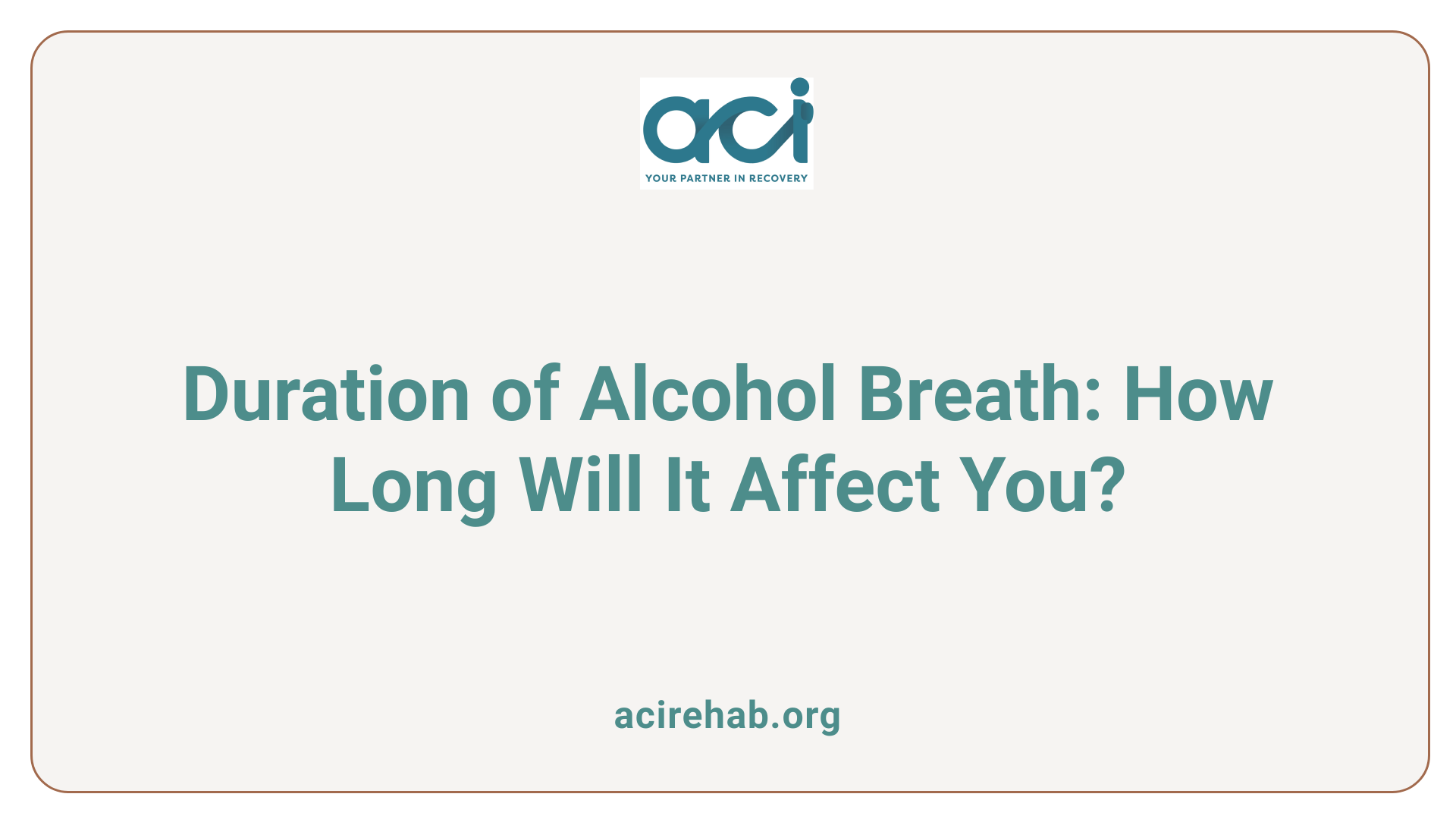
How long does alcohol breath typically last?
The smell of alcohol on your breath typically lasts for a few hours. However, if you’ve consumed a significant amount of alcohol, the odor can linger much longer. This is primarily because alcohol is metabolized into byproducts like acetaldehyde, which is a major contributor to the unpleasant smell associated with alcohol breath.
Hydration plays a crucial role in how long the smell persists. Alcohol consumption leads to dehydration, which can reduce saliva production. Saliva not only helps wash away food particles and bacteria but also fights against bad breath. Therefore, maintaining hydration through drinking water can help mitigate the odor and support the body’s detoxification processes.
Influence of consumption and metabolism
The duration of alcohol breath is influenced by several factors, including the amount of alcohol consumed, individual metabolism rates, and oral hygiene practices. The standard rate of alcohol elimination from the body is approximately one standard drink per hour. Longer consumption times or higher quantities can result in extended periods of alcohol breath, lasting several hours or even up to a day.
It’s important to remember that while temporary solutions like chewing gum, sucking on mints, or using mouthwash may mask the smell for social situations, they do not address the underlying metabolic process. Good oral hygiene—consisting of regular brushing, flossing, and drinking water—remains the most effective way to manage alcohol breath in the long term.
Dispelling the Myths Around Alcohol Breath Elimination
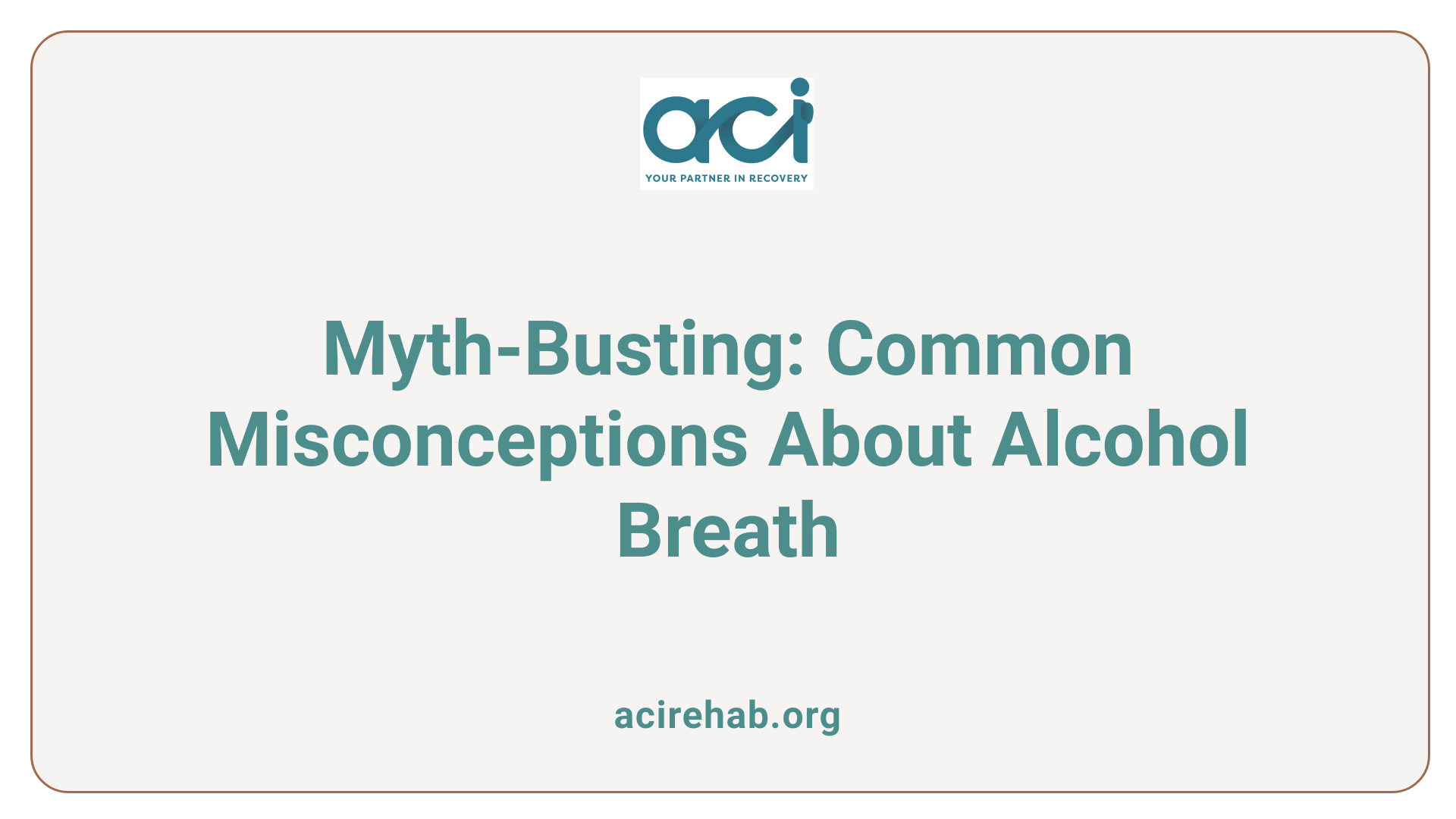
What are common misconceptions about getting rid of alcohol breath?
Many people harbor misconceptions about how to get rid of alcohol breath. One prevalent myth is that consuming certain foods or beverages, such as coffee or strong-smelling items like garlic, can effectively remove the unpleasant odor. In truth, these methods merely mask the smell for a short period. They do not address the root cause, which is the exhalation of acetaldehyde, a byproduct of alcohol metabolism, from the lungs.
Another misconception is the belief that smoking or using minty products can eliminate alcohol breath. Rather, these can exacerbate hydration issues and provide no advantage in combating the effects of alcohol on breath. It’s also a common error to assume that clear, neutral-smelling alcohols won’t cause noticeable breath odor. The reality is that all types of alcoholic beverages, regardless of color or aroma, can lead to unpleasant breath.
Temporary vs long-term solutions
Temporary solutions include using oral hygiene products like mouthwash, chewing gum, or sucking on mints. While these can give a refreshing effect, they do not provide a lasting solution. The most reliable way to fully eliminate alcohol breath is simply to allow for time. The body metabolizes alcohol at a pace of approximately one standard drink per hour.
Ultimately, the best approach to combatting alcohol breath is not solely relying on quick fixes but focusing on maintaining good oral hygiene practices and managing alcohol consumption sensibly. Proper hydration and consuming foods high in protein or fat can mitigate the effects of alcohol, while regular mouth cleaning routines can help maintain fresher breath—even if alcohol breath takes time to dissipate completely.
Incorporating Lifestyle Changes for Better Breath Management
What lifestyle changes can help in managing alcohol breath more effectively?
To manage alcohol breath more effectively, individuals can implement several lifestyle changes. Reducing alcohol consumption is essential, as it decreases the accumulation of acetaldehyde, the compound responsible for the unpleasant odor associated with alcohol breath. By limiting intake, individuals not only minimize the likelihood of developing noticeable breath odor but also support their overall health.
Another significant factor is staying well-hydrated. Drinking water alleviates dryness in the mouth, which worsens breath smell. Adequate hydration promotes saliva production that helps wash away bacteria and food particles, further mitigating the effects of alcohol breath.
What oral hygiene practices are beneficial?
Maintaining good oral hygiene is crucial for freshening breath after consuming alcohol. Regular brushing and flossing effectively remove bacteria and alcohol residue from the mouth. It’s also advisable to use an alcohol-free mouthwash, as this can help neutralize odors without contributing to further dehydration.
How can dietary adjustments support better breath?
Dietary adjustments before and during drinking can also play a role. Consuming foods high in fat and protein can slow alcohol absorption, reducing its smell and improving breath. Additionally, chewing sugar-free gum or using mints can stimulate saliva production, helping to combat odor by washing away alcohol residues.
Incorporating these lifestyle changes can lead to a noticeable improvement in breath quality after drinking alcohol, allowing for more confident social interactions and better oral health overall.
Quick Fixes vs. Long-Term Solutions for Alcohol Breath
Mouthwash and Oral Hygiene Products
To combat alcohol breath, the quick approach often involves using mouthwash or other oral hygiene products. Alcohol-free mouthwash is particularly effective as it helps kill odor-causing bacteria and freshens your breath without adding to dehydration. Additionally, employing a travel oral care kit with a toothbrush and toothpaste allows for on-the-go cleanup. Regular brushing, flossing, and even tongue scraping are essential for combating unpleasant odors, especially after consuming alcohol.
Temporary Masking Techniques
While some temporary solutions can alleviate the smell of alcohol breath, they do not provide permanent relief. Techniques such as sucking on sugar-free mints or chewing gum can stimulate saliva production, helping wash away residual alcohol. Eating foods with strong odors like garlic or drinking coffee may mask the scent of alcohol momentarily; however, these methods should be viewed as short-term fixes rather than effective solutions. Ultimately, the only way to truly eliminate alcohol breath is to allow your body time to metabolize the alcohol.
The Role of Hydration in Managing Alcohol Odor
Importance of Water
Staying hydrated is essential when consuming alcohol. Alcohol acts as a diuretic, leading to dehydration, which can exacerbate bad breath by reducing saliva production. Saliva is crucial in washing away food particles and bacteria that cause foul breath. Drinking plenty of water helps dilute alcohol in salivary glands, lessening the intensity of the odor associated with alcohol breath. Aiming for at least eight glasses of water a day supports overall hydration, further aiding in flushing out toxins from the body post-drinking.
Oral Health Benefits
Hydration also plays a vital role in maintaining oral health. By stimulating saliva production, drinking water combats dry mouth, a common issue after alcohol consumption. This reduction in dryness fosters a less hospitable environment for bacteria that thrive in a dry mouth, thereby minimizing bad breath. Regular hydration also assists in rinsing away odor-causing debris, promoting fresher breath and better oral hygiene overall.
Understanding Alcohol’s Impact on Oral Health
Alcohol’s drying effect
Alcohol consumption can lead to dehydration, which in turn reduces saliva production. Saliva plays a vital role in maintaining oral health by washing away bacteria and food debris. When alcohol is consumed, this drying effect makes the mouth more conducive to bad breath due to the increased growth of odor-causing bacteria.
Promoting saliva production
To combat the negative effects of alcohol on breath, stimulating saliva production is crucial. Options such as chewing sugar-free gum or mints can help. These stimulate saliva flow, thus aiding in washing away alcohol residues. Consuming citrus fruits, green tea, or other fresh herbs like parsley can also help neutralize odors and encourage hydration, further supporting oral health after drinking.
Combining Natural Remedies for a Fresher Breath
Herbs and Spices for Breath
Natural remedies can play a significant role in combating alcohol breath. Fresh herbs like parsley and mint are popular choices, thanks to their chlorophyll content, which helps neutralize odors. Chewing on these herbs stimulates saliva production, washing away alcohol residue and providing a temporary fresh scent. Additionally, strong-smelling spices, such as fennel seeds, can also be effective in masking unpleasant odors.
The Effectiveness of Natural Solutions
While natural remedies are handy, they primarily serve to mask alcohol breath rather than eliminate it. Options like drinking lemon water can help due to its citric compounds fighting oral bacteria, while consuming crunchy vegetables such as apples and celery can aid in flushing out lingering smells. Green tea is another excellent choice, as it contains antioxidants that help reduce the bacteria responsible for bad breath.
Here’s a quick overview of some effective natural remedies:
| Natural Remedy | Function | Benefits |
|---|---|---|
| Chewing mint | Stimulates salivation | Freshens breath temporarily |
| Drinking lemon water | Neutralizes odor | Fights bacteria in the mouth |
| Eating apples | Cleanses the mouth | High water content helps freshen breath |
| Green tea | Reduces bacteria | Antioxidant properties promote oral health |
| Chewing fennel | Aromatic odor mask | Aids digestion and freshens breath |
Incorporating these strategies into your routine can help maintain fresher breath after consuming alcohol, though remember: time is the only true way to eliminate alcohol breath entirely.
Final Thoughts on Managing Alcohol Breath
Managing alcohol breath effectively combines informed lifestyle choices, good oral hygiene, and understanding the biological processes behind alcohol metabolism. While temporary solutions can offer short-term relief, the ultimate key lies in allowing time for proper metabolism and being mindful of alcohol consumption. With these strategies and practices, maintaining fresh breath after drinking becomes achievable, supporting both social interactions and personal confidence.
References
- How to Get Rid of Alcohol Breath: What Works (and What Doesn’t)
- How To Get Rid of Alcohol Breath: 10 Tips To Removing The Smell
- How to Get Rid of Alcohol Breath – Conifer Park
- How To Manage Alcohol Breath – Colgate
- 4 best ways to get rid of alcohol breath instantly and fast? – Laifen-US
- How To Get Rid Of Alcohol Breath – Townsend LA
- How To Get Rid Of Alcohol Breath? – Niagara Recovery
- How to Manage Alcohol Breath | Colgate®

